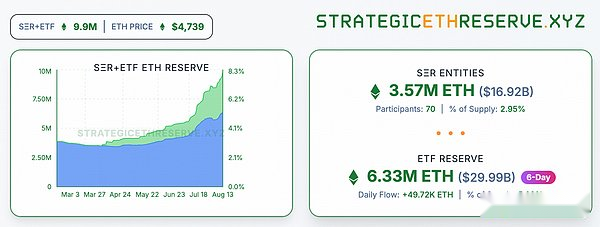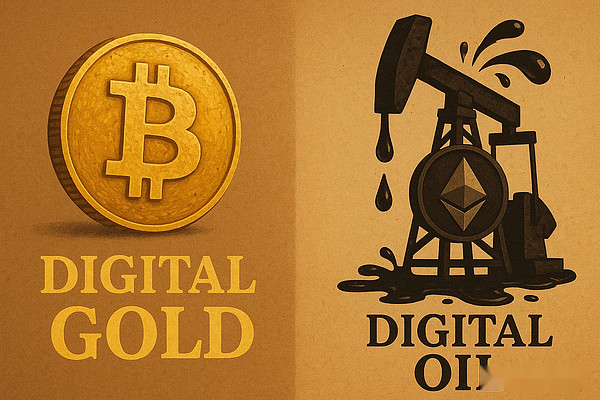
summary
-
Driven by Wall Street’s support and continued increase in corporate vaults, the debate over whether Ethereum could surpass Bitcoin has reappeared.
-
Bitcoin is regarded as a scarce, secure and predictable “digital gold” suitable as a wealth storage tool; while Ethereum is considered a versatile, profitable “digital oil” that powers the wider Web3 economy.
-
Supporters believe that Ethereum may make ETH scarce or even surpass BTC with its wider application scenarios, the continuous adoption of institutions and corporate vaults, and the incremental contraction brought by equity argumentation, fee mechanisms and pledge lockouts, thus having the potential to overtake.
-
Sceptics believe that Bitcoin’s simplicity, stability, and its unique position as a means of value give it a natural defensive advantage; while Ethereum faces challenges such as uncertainty brought by the protocol, higher complexity and security trade-offs, and fierce competition among smart contract platforms.
Introduction: The rise of Ethereum’s speculation over Bitcoin
Since its inception, Bitcoin has occupied the largest share of the cryptocurrency market and has always been the most valuable cryptocurrency, while Ethereum has always been the second.Bitcoin’s dominance seems unshakable, but recent developments have once again sparked debate over whether Ethereum can eventually replace it.
Well-known analysts are optimistic about Ethereum.Fundstrat co-founder Tom Lee believes Ethereum is in the “bitcoin moment of 2017”, indicating that it is about to usher in a wave of mass adoption.Lee predicts that given Wall Street’s accelerated adoption and Ethereum’s position in blockchain finance, Ethereum could deliver 100 times in the long run, even surpassing Bitcoin’s valuation
A new trend is that companies include ETH on their balance sheets due to their unique advantages.Small listed companies choose ETH as their reserve asset because they are in a “prime position” between reputation and growth potential.

It is worth noting that holding ETH can yield active returns: unlike Bitcoins that are held purely for price increases, Ethereum’s Proof of Stake (PoS) mechanism allows holders to obtain annualized returns of 3% to 4% through staking.This earnings narrative that positions ETH as a profit-generating asset makes it very attractive to “tech-based” investors seeking upside and gains.
Bitcoin vs. Ethereum: Value Proposition Comparison

Bitcoin’s Value Proposition – Digital Gold
Bitcoin is often called “digital gold” because of its storage of value and its fixed scarcity.
The total amount of Bitcoin will always be only 21 million, which makes its scarcity and predictability convincing.The Bitcoin network is securely protected through the Proof of Work (PoW) mechanism, making it extremely secure and decentralized.Its simplicity is one of its biggest advantages – Bitcoin focuses on only one thing, that is, preserving value in a censorship-resistant way.In more than 14 years, it has built a strong brand as the first cryptocurrency with its largest market capitalization.This persistence and clear positioning prompted a large number of institutions to adopt Bitcoin – from hedge funds to states – to see it as a means to resist inflation and macroeconomic uncertainty.Bitcoin’s conservative community (reluctant to change the protocol rules) keeps the asset stable and predictable, traits that attract institutions and long-term holders.In short, Bitcoin is a reserve asset in cryptocurrency and is highly valued for its scarcity, security and credibility.
Ethereum’s value proposition—digital oil for the digital economy
By contrast, Ethereum is a multi-functional platform often compared to digital oil because it powers the entire cryptocurrency application economy.
As a leading smart contract blockchain, the Ethereum network is the basic layer of decentralized finance (DeFi) protocol, non-fungible token (NFT) market, stablecoins, games, etc.This means that ETH is not only a means of store of value, but also the “fuel” consumed to run transactions and programs on the network.
Ethereum currently uses a Proof of Stake (PoS) consensus mechanism, allowing investors to pledge ETH and earn earnings by maintaining network security (annualized 3-4%).This profit-generating feature makes ETH similar to bonds in addition to being practical.There is no hard cap on Ethereum’s supply, but since the implementation of the Cost Destruction Mechanism (EIP-1559) in 2021 and the completion of the merger in 2022, it has shown deflation in some periods, destroying more ETH than newly issued.Overall, Ethereum’s value stems from its versatility and continuous innovation – it is a programmable platform on which numerous digital assets and services are built, and is essential to the booming Web3 economy.
Ethereum’s argument over Bitcoin
Some analysts believe that Ethereum’s growing influence may eventually lead it to surpass Bitcoin.Key arguments supporting the potential trend of Ethereum surpassing Bitcoin include:
Widespread utility and demand
Ethereum has far more functions than Bitcoin.Its blockchain carries thousands of decentralized applications and the number of transactions processed every day is far more than Bitcoin, which makes on-chain activity and handling fees higher than Bitcoin.This broad range of practicality—from supporting DeFi lending and trading to NFTs and stablecoins—means that Ethereum has a lot more than investments.In other words, Ethereum is a key investment in crypto economic activity, not just a means of store of value.If the digital economy built on Ethereum continues to expand, the demand for Ethereum may outweigh the demand for Bitcoin.
Institutional adoption and asset reserves
In 2025, a wave of “Ethereum Vault” companies emerged.For example, BitMine Immersion Technologies began accumulating ETH at an unprecedented rate, acquiring more than 1 million ETH in just 27 days.Overall, the number of ETH publicly disclosed by companies soared – more than 1 million by mid-2025, compared with only 116,000 a few months ago.These companies are attracted by Ethereum’s growth potential and pledge returns, and actually turn corporate vaults into profitable investments.
Favorable supply dynamics
Ethereum’s monetary policy is becoming increasingly tight.After the move to Proof of Stake (PoS), Ethereum’s net issuance fell sharply (new ETH has decreased by more than 90%).In addition, the EIP-1559’s formal cost destruction mechanism means that high network usage actually destroys ETH, and sometimes even leads to supply deflation.This is in stark contrast to Bitcoin’s fixed inflation plan (Bitcoin’s mining activity will last until 2140).During peak usage, Ethereum’s supply may actually decrease, such as when token destruction exceeds the issuance.

Many Ethereum supporters believe that in reality, this may make Ethereum more scarce than Bitcoin, especially as demand grows.The combination of lower inflation, potential deflation, and staking lockouts (currently more than 30% of Ethereum supply is locked in staking contracts, reducing the circulating supply) may lead to a faster tightening of Ethereum’s effective supply than Bitcoin.This scarcity combined with practicality may cause Ethereum’s price to rise relative to Bitcoin.
Arguments against Ethereum surpassing Bitcoin
People who question Ethereum surpasses Bitcoin pointed out that Bitcoin may retain its dominance and also pointed out the obstacles facing Ethereum.The main arguments against Ethereum surpassing Bitcoin include:
Bitcoin’s simplicity, stability and first-mover advantages
Bitcoin’s single use as a reliable currency is seen as an advantage in cementing its dominance.It is simple, robust and trustworthy.As the first cryptocurrency, its stability (no significant changes have occurred since its inception or how currency rules or works) has inspired confidence that it will continue to be a reliable means of store of value.
Ethereum’s ever-changing features, while innovative, may also be seen as a risk—changes such as adjustments to monetary policy or technological upgrades can bring uncertainty.Bitcoin’s solid position and conservative design make it a safe choice for large investors.
Ethereum’s complexity and security trade-offs
Ethereum has rich features, which also means that it has a larger attack surface and more likely to make mistakes.Smart contracts on Ethereum are vulnerable to hacking and vulnerabilities. Although this is not a flaw in the Ethereum basic layer itself, it will affect people’s confidence in it and cause losses to the ecosystem.
Running an Ethereum node requires more resources than running a Bitcoin node, and the long-term impact of Ethereum’s shift to Proof of Stake (PoS) such as the potential risks of centralization of equity, or the unclear economic model for decades to come, remains controversial.Bitcoin’s design – simple and unchanging – can be said to have gone through more tests on the purpose of single value preservation.
The competition for smart contract platforms is fierce
Ethereum is competing with many other smart contract platforms (Solana, Sui, Cardano, BSC, etc.), and all parties are competing for a place in the digital economy market.
Bitcoin’s segment is more monopolistic – no other network poses a serious challenge to it as a chain of value storage.Ethereum must maintain its dominance in the competition among many “Ethereum killers”.If future technological changes or regulation favor other protocols, Ethereum’s path to surpassing Bitcoin may be hindered.In short, Bitcoin’s focus positioning and lack of direct competition in its category give it a certain defensive advantage.
in conclusion
In short, Bitcoin and Ethereum occupy different positions in the cryptocurrency space.Bitcoin is like gold: as a relatively niche asset (in terms of practicality), but dominates as a means of store of value.It is valued for its simplicity, scarcity and security—just as gold is valued despite being mostly inertia.Meanwhile, Ethereum powers a broader economic dimension, similar to oil or infrastructure in a digital economy.
The value of ETH is not only derived from holding, but also from use – for running applications, facilitating transactions, and generating revenue in the DeFi ecosystem.This fundamental difference means that the two assets can coexist under various conditions and exhibit different performance.
The question of “beyond” ultimately depends on time and maturity.Bitcoin’s narrative has matured and deeply entrenched in structure; while Ethereum’s narrative is still evolving with the development of Web3.The digital economy that Ethereum aims to support is still in its early stages.DeFi and Web3 applications may take years to reach a scale that is sufficient to prove that Ethereum is worth more to the world than Bitcoin’s market capitalization.






